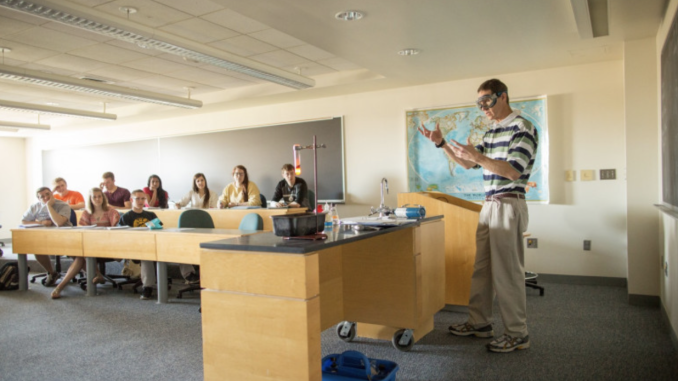
Morgan Mason (momason@ursinus.edu)
Not a creature was stirring – only the CHEM students at Ursinus
The IDC, Pfahler, and Thomas are no strangers to the hustle and bustle of students studying seven days a week, often into the late hours of the night. Yet, some Chemistry students are not too keen on their exams being scheduled during the evenings. With fatigue, burnout, and exhaustion at play, they fear their success is being stunted by “nocturnal” demands.
Students in CHEM-207 meet three days a week for a 50-minute lecture. Those students who take a lab meet once a week for a 3-hour lab in addition to lectures. For exams, the students kick into high gear, as their tests for this course take place during the evening hours in a lecture hall.
Darby Rogers ‘24 thinks these evening exams are doing more harm than good. He noted that the exam process is less than ideal because “usually we have these exams with bigger classes and multiple sections.” Sydney Bowman ’22 says that the night exams are “awful because they are so late. They take up a lot of time in my day, and if I have practice, I have to miss practice which is also stressful because my coach says academics come first but try and hurry up.” Night exams are putting students in an uncomfortable position any way you cut the cake. They must move around their extra-curriculars, work schedules, and homework to sit for an exam that could have been in the place of a normal lecture.
Most students’ main frustration with night exams, though, is pure exhaustion. Their daily schedules are jam-packed, and their brains simply don’t function like they do in the morning. Brooke Schultz ‘22 stated, “by the time the exam starts, you’re burnt out from a whole day of class, meetings, and studying. You’re not at your best to take an exam that’s twice as long as an exam you’d take in any other class.”
When asked why examinations happen during the evening hours, Dr. Ryan Walvoord said that the evening exams allow multiple sections to take the same exam synchronously, which ensures fairness; that longer exams allow students to focus on synthesizing information without worrying about time constraints; and that students with academic accommodations can take the exam at the same time as others and have access to the instructor.
Lastly, he stated that, “Interestingly, and perhaps surprisingly, the subject of evening exams has never appeared in either informal student feedback on how to improve the course or in the SPTQs.”
Even with students mentioning these issues on evaluations, the message the Grizzly heard was that some are struggling. Maybe reconsidering nighttime exams and the so-called “benefits” could begin to scratch the surface of helping students feel heard on this issue.
